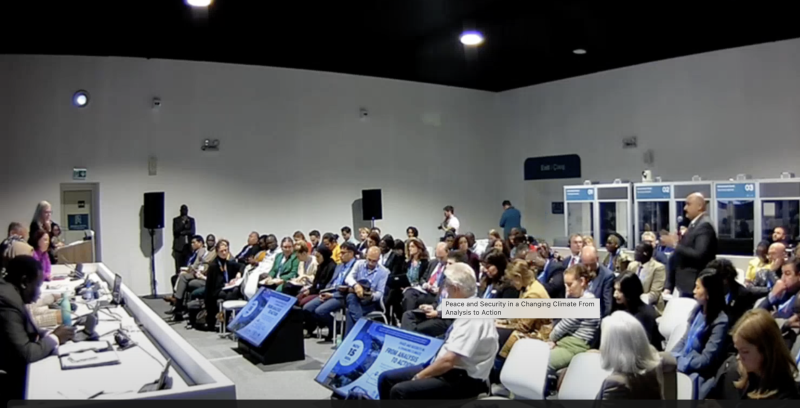

Baku, Azerbaijan – 15 November 2024 - Today, at COP29, the Climate Security Mechanismi (CSM) at the United Nations and the Group of Friends on Climate and Securityii convened an official UNFCCC COP29 side event titled “Peace and Security in a Changing Climate: From Analysis to Action”.
Held on COP29 Peace, Relief and Recovery Day, the high-level panel highlighted the linkages between climate change, peace and security, and brought together key voices to explore practical solutions for advancing peace-positive climate action. The event culminated in a pledges and commitments session, where participants announced new pledges of support and partnerships. These included:
The event brought together distinguished panellists from government, the United Nations, and civil society. Discussions focused on how the climate emergency acts as a risk multiplier, with displacement and migration, food insecurity, water scarcity, and livelihood loss among the primary channels through which climate change undermines peace and stability. Those that have contributed the least to climate change face the greatest risk of being overwhelmed by its impacts. Where climate change intersects with fragility and conflict, its effects are especially severe. Many of the countries most vulnerable to climate risks host a United Nations peacekeeping or special political mission, underscoring the need for integrated approaches to climate resilience and peacebuilding.
Ms. Shaima Gargash, Director of Energy and Sustainability Affairs, UAE Ministry of Foreign Affairs expressed the United Arab Emirates’ strong support: “As the UAE, we are particularly pleased to be a donor partner to the Climate Security Mechanism. The CSM has been an effective bridge between last year’s landmark COP28 Declaration on Climate, Relief, Recovery, and Peace and the sustained focus on communities facing fragility, conflict, and humanitarian situations at COP29. The CSM’s analysis and advisory services help to increase climate action and finance in these highly vulnerable settings – one of the best investments we can make for peace and development. This event has embodied the Declaration’s vision, demonstrating how global partnerships can drive resilience and peace through effective climate action”.
“A very important action implemented through CSM is the deployment of climate, peace, security (CPS) advisors. Switzerland supports a new CPS Advisor at the UN Office to the African Union”, said Ambassador of Switzerland to Azerbaijan, Thomas Stähli, in his welcoming remarks.
“Addressing climate and security necessitates collective action and the inclusive leadership of Pacific nations” said Mr. Reagan Moses, Secretary for the Department of Climate Change and National Resilience of Nauru. “Partnerships, such as those promoted by the Climate Security Mechanism, are essential for achieving our shared objectives”.
“We cherish that CSM provides its expertise and collaborates with many different stakeholders. Such as the Women Peace Humanitarian Fund that fosters grassroot women-led projects to build climate resilience and sustain peace”, said Mr. Oliver Rentschler, Director-General for Climate Diplomacy and Geoeconomics, German Federal Foreign Office.
In the Liptako Gourma region of Burkina Faso, Mali, and Niger, the Climate, Peace and Security Advisor supports regional and national strategies and action plans. H.E. Ms. Hawa Aw, Executive Secretary of the Liptako Gourma Authority, highlighted: “In a historic move, the landmark Bamako Declaration emphasises the integration of climate policy and security, which should be catalysed into impactful actions for a more resilient Sahel. In countries within our region with challenges to institutional capacities, the threat of climate change is deeply felt. Climate, peace and security initiatives should integrate a socioeconomic dimension to bring appropriate response to the people. We cannot face this alone, and we welcome the support to regional entities and all partners through the CSM to strengthen ongoing national efforts”.
In regions like Afghanistan, the CSM has brought together local authorities, civil society, and vulnerable communities to discuss solutions for climate challenges. Ms. Marwa Alam Safa, Founder and CEO of the Climate and Environment Youth Initiative, praised these efforts, stating: "The CPS Advisor has given a platform to Afghan voices in peace and climate discussions. The advisor-supported dialogues on climate change brought together diverse actors, ensuring their unique perspectives and knowledge were heard. Such initiatives are essential for inclusive and effective peace-positive climate solutions”.
H.E. Mr. Bartel Africano, Undersecretary of Environment, Ministry of Environment and Forestry, Republic of South Sudan, stated: "The relentless impacts of climate change pose key obstacles to South Sudan’s efforts to build resilience, peace and development. The Climate, Peace and Security Advisor provides crucial support to the government of South Sudan in addressing and mitigating the impacts of climate change on peace. There are early indications that the government’s flooding preparedness task force is reducing the number of people initially estimated to be impacted by the current flooding crisis”.
The Green Climate Fund (GCF) highlighted its commitment to climate adaptation and resilience efforts in conflict-affected settings. Ms. Stephanie Speck, Head of Special Initiatives at the GCF’s Office of Strategy and Impact, remarked, “It is often said that investing in climate adaptation and resilience in conflict-affected settings is too risky. But I would argue that, given current climate projections, the far greater risk lies in not investing”.
For more information, watch the video recording from the event as well as the video on Climate, Peace and Security in South Sudan.
Reposted from un.org